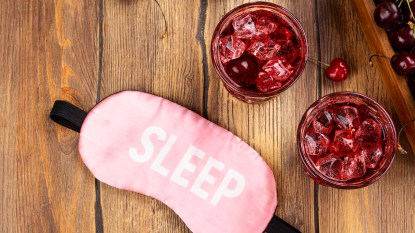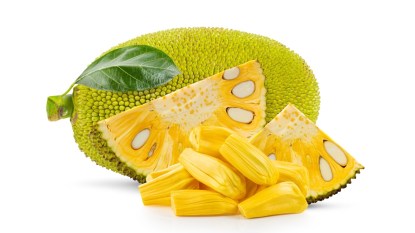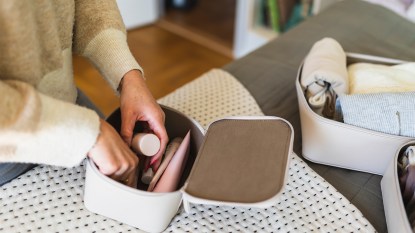Doctors & Dentists: What You Need to Know If You Wake Up With a Dry Mouth
Dry mouth could be the sign of an underlying condition and can pose a threat to teeth and gums

Do you feel a dry, stickiness in your mouth when you first wake up? Or maybe you have a strong sense that your breath smells bad? You’re not alone: An article published in Brazilian Dental Journal found that 22% of people wake up with a sticky, dry feeling in their mouth or throat. Other signs of dry mouth include hoarseness first thing, cracked lips or sores in your mouth and even trouble swallowing. And the chances of waking with dry mouth (and any of its symptoms) increase as you get older. If you’re concerned, well, you should be — at least a little — because waking up with a dry mouth can lead to cavities and gum disease, and could be a signal of an underlying medical condition that needs addressing. Read on to learn more.
Top causes of waking with dry mouth
Waking with dry mouth, also known as xerostomia, occurs when salivary glands in the mouth simply don’t produce enough saliva to keep your mouth moist, explains Mas Takashima, MD, chair of otolaryngology at Houston Methodist Hospital. “It can occur out of the blue and happen now and then or more frequently, depending on the cause.” (Click through to learn how dry mouth can contribute to gum disease.)
Saliva plays a crucial role in maintaining oral health: It washes away tiny food particles and bacteria, helping prevent buildup of plaque that can lead to tooth decay. Saliva further prevents tooth decay by neutralizing acids produced by bacteria, explains Jordan Weber, DDS, a dentist at Burlington Dental Center in Burlington, KS. “Saliva also enhances your ability to taste and makes it easier to chew and swallow and is rich in calcium and phosphate ions, which are essential for remineralizing tooth enamel,” he explains. In addition, enzymes in saliva aid in digestion and can help control the growth of harmful bacteria in the mouth. “Saliva helps to prevent infections and reduce the risk of oral diseases and can aid in wound healing and tissue repair within the mouth,” adds Dr. Takashima.
Along with getting older, one of the most common culprits is mouth breathing (during the day as well as when you sleep) typically caused by nasal congestion resulting from a deviated septum, sleep apnea or nasal allergies. “Less often, medical treatments like radiation therapy for head and neck cancers and conditions like diabetes and Sjogren’s syndrome can lead to chronic dry mouth,” explains Dr. Takashima.
But there are plenty of other everyday reasons you might wake up with dry mouth tomorrow morning. Here are four:
1. Medications can cause you to wake up with dry mouth
Many prescription and over-the-counter medications, such as antihistamines, decongestants, antidepressants and certain blood pressure medications can cause dry mouth as a side effect, explains Janet O’Mahony, MD, an internist at Mercy Medical Center in Baltimore, MD. Indeed, while medicines like antihistamines are helpful at drying up postnasal drip or runny eyes, the very same mechanism that eases those allergy symptoms can decrease salvia production, leading to waking with a dry mouth. (Click through for the best nasal decongestant spray, which can help you wean off of antihistamines.)
Other medicines with the potential to cause dry mouth include those that treat overactive bladder and ADHD. (Click through to learn about the home remedy that cured one woman’s overactive bladder.)
To outsmart medication-induced dry mouth: Switch to another medication! “In many instances, there are several medicine options that treat health issues, and talking to your doctor about alternatives can help you combat the bothersome side effect of dry mouth,” says Dr. O’Mahony.
2. A vitamin deficiency can cause you to wake up with dry mouth
Animal studies suggest that diets that drastically reduce or strictly eliminate animal proteins can leave you at risk of B vitamins, vitamin A, iron, zinc and protein deficiencies that are linked to decreased production of saliva.
To outsmart diet-induced dry mouth: “You can easily keep a plant-based diet, or those that restrict animal proteins from slowing down your saliva production by talking to your doctor about screening for possible vitamin deficiencies and then proper supplementation,” says Dr. Weber. (Click through to learn more about how vegetarianism is linked with depression.)
3. Some mouthwashes can cause you to wake up with dry mouth
While they’re great at freshening your breath, Dr. O’Mahony cautions, “Mouth rinses and mouthwashes can dry your mouth if they contain alcohol or peroxide.” Research published in Japanese Dental Science Review finds that these ingredients also decrease saliva secretion to leave your mouth feeling dry. Similarly, Dr. O’Mahony says regularly drinking wine, beer or other alcohol beverages can also lead to waking with dry mouth.
To outsmart mouthwash-induced dry mouth: Simply switch to an alcohol-free mouthwash, like Colgate Total Advanced Pro-Shield Alcohol Free Mouthwash (Buy on Amazon, $5.49 for 33.8 oz).
4. Dehydration can cause you to wake up with dry mouth
Not drinking enough water during the day and before bedtime might prevent a midnight trip to the bathroom, but it can also have you waking up to a mouth that feels like sandpaper. So says Chris Kim, DDS, FAGD, a dentist at Livewell Dental in Fairfax Station, VA, who explains that when your body is not adequately hydrated, your salivary glands can’t produce enough saliva necessary to keep your mouth moist.
To outsmart dehydration-induced dry mouth: Drinking the oft-recommended 6 to 8 glasses of water a day can help (click through to see how a motivational water bottle may be the solution to drinking more water), and Dr. Kim offers another simple fix: “Using a humidifier in your bedroom also adds moisture to the air, which can be especially helpful if mouth breathing is the cause of you waking up with dry mouth.”
6 ways to avoid waking up with a dry mouth
These simple steps below can ramp up production of saliva to keep your mouth from feeling like a desert when you wake up.
1. Eat more ‘wet’ foods
“Enrich your diet with watermelon, cucumber and celery to combat dry mouth as they help to promote saliva production,” encourages Dr. Kim. Try freezing watermelon balls to pop in your mouth anytime of the day for a refreshing bite that boosts saliva production and topping tonight’s salad with slices of fresh, crisp cucumbers and chunks of celery.
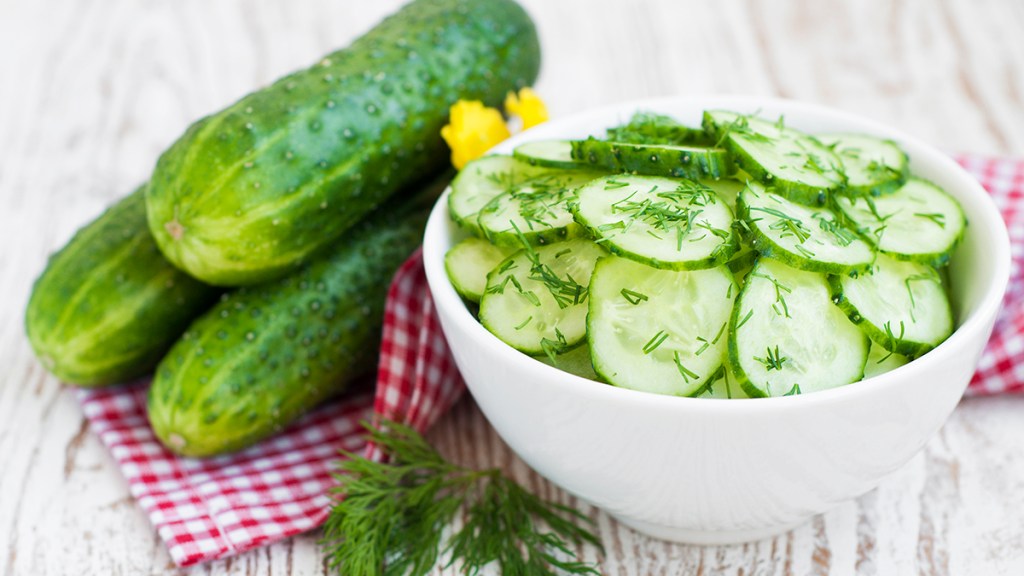
2. Swap out your toothpaste
Good oral hygiene promotes normal saliva production, along with keeping your mouth healthy and feeling fresh. However, if you’re prone to dry mouth, Dr. O’Mahony urges opting for fluoride toothpastes free of sodium lauryl sulfate, (SLS) a popular detergent found in many toothpastes (as well as shampoos) that can contribute to mouth dryness. An SLS-free fluoride toothpaste to try: Tom’s of Maine (Buy on Amazon, $29.53 for a pack of 3).
3. Try mouth taping at night
One great way to dodge mouth breathing at night: Use a gentle medical tape to hold your lips together while you sleep, suggests Cindy Geyer, MD, a functional medicine physician at The UltraWellness Center in Lenox, MA. This trick, which has become popular in recent months, requires applying pieces of micropore tape cut in 3 to 4 inch strips vertically across your lips from the bottom of your nose to underneath your chin, then one piece horizontally across the top of the vertical tape strips and another along the bottom. Dr. Geyer says it can take a week or so to get used to the tape, but it will make a difference. Click through to see how mouth tape can also stop storing and how mouth taping for sleep offers additional health benefits.
For more, check out this video from James Nestor, author of Breath:
4. Snack on these fruits
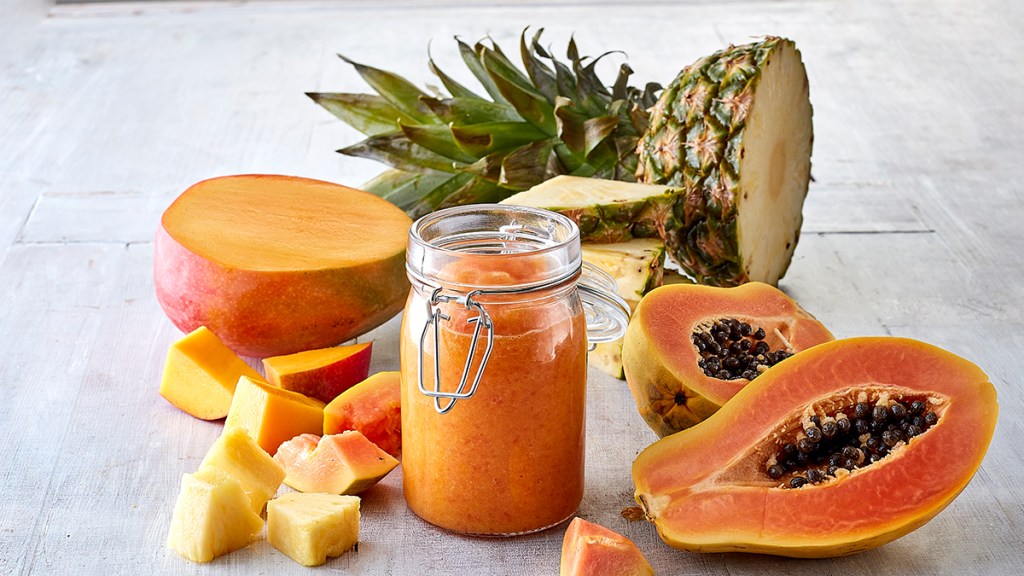
Papain, an enzyme in the papaya fruit, helps digest proteins and can stimulate saliva in just 7 days, according to research published in ACTA Scientific Pharmaceutical Sciences. Additionally, bromelain, a compound in pineapple, was found to boost saliva production. (Click through to learn more about bromelain’s benefits for skin.) Eating these tasty fruits can lessen your chance of waking with dry mouth.
5. Consider a new sleeping position
Not ready for mouth taping? No problem! “Changing your sleeping position by sleeping on your stomach, rather than your back, encourages nasal breathing rather than mouth breathing,” says Dr. Weber. One way to promote stomach sleeping is by stitching a tennis ball into the back of a t-shirt or your PJ’s so you feel it when your roll over.
6. Look to lozenges
Sucking on a lozenge containing glycerin increases saliva production, keeping your throat moist and comfortable. In fact, several studies have found that lozenges can stimulate saliva production, with some lozenges increasing saliva by as much as 10 times the normal amount. Two to try: Grether’s Pastilles (buy on Amazon, $14.99 per pack) or TheraBreath Dry Mouth Mandarin Mint Lozenges (buy at Walmart.com, $8.12 for 100 lozenges), and click through for more information about how to pick the best throat lozenge for you.
When to see a doctor if you wake up with dry mouth
Experts agree there’s no need to see a doctor if you wake up with dry mouth for a few days or experience it only every now and then. However, because prolonged dry mouth can trigger unpleasant issues like bad breath and painful conditions like mouth ulcers, cavities and even pain when swallowing and trouble wearing dental appliances like dentures or braces, it’s important to consult a healthcare provider for dry mouth that lasts longer than a few weeks. (Click through to learn about the dry mouth/covid connection). “Additionally, saliva contains enzymes that aid in digestion, so untreated dry mouth may result in digestive discomfort,” says Dr. Weber.
This content is not a substitute for professional medical advice or diagnosis. Always consult your physician before pursuing any treatment plan.
For more natural ways to improve your sleep:
Discover The Best Magnesium for Sleep and Wake Up Happy!
The ‘Lullaby’ Lavender Tea Guaranteed to Melt Stress and Deepen Sleep
Compression Socks Can Dramatically Improve Your Sleep
Tart Cherry Juice Drinks Can Bet the Key to Deeper Sleep, Less Pain and More





